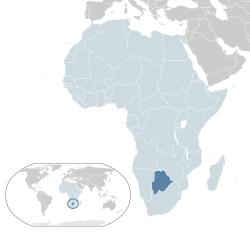Republic of Botswana Lefatshe la Botswana (Tswana) | |
|---|---|
| Motto: Pula "Rain" | |
| Anthem: Fatshe leno la rona "Blessed Be This Noble Land" | |
| Capital and largest city | Gaborone 24°39.5′S 25°54.5′E / 24.6583°S 25.9083°E |
| Official languages | English |
| National language | Setswana |
| Ethnic groups (2024) | |
| Religion (2021) |
|
| Demonym(s) |
|
| Government | Unitary parliamentary republic with an executive presidency |
| Duma Boko | |
| Ndaba Gaolathe | |
| Dithapelo Keorapetse | |
| Gaolapelwe Ketlogetswe | |
| Legislature | Parliament (National Assembly) |
| Independence from the United Kingdom | |
| 31 March 1885 | |
Governed under High Commissioner for Southern Africa | 9 May 1891 |
Established (Constitution) | 30 September 1966 |
| Area | |
Total | 581,730 km2 (224,610 sq mi) (47th) |
Water (%) | 2.7 |
| Population | |
2023 estimate | 2,417,596 (145th) |
2022 census | 2,359,609 |
Density | 4.1/km2 (10.6/sq mi) (231st) |
| GDP (PPP) | 2025 estimate |
Total | |
Per capita | |
| GDP (nominal) | 2025 estimate |
Total | |
Per capita | |
| Gini (2016) | medium inequality |
| HDI (2022) | high (114th) |
| Currency | Pula (BWP) |
| Time zone | UTC+2 (Central Africa Time) |
| Date format | dd/mm/yyyy |
| Calling code | +267 |
| ISO 3166 code | BW |
| Internet TLD | .bw |
Website www | |
Table of Contents
Introduction to Occupational Health and Safety Standards
Occupational health and safety (OHS) standards in Botswana play a vital role in safeguarding the health and well-being of workers across diverse industries. The implementation of these standards is crucial as it addresses various workplace hazards, aiming to prevent accidents and promote a safe working environment. OHS standards encompass a broad spectrum of regulations that govern aspects such as the use of equipment, exposure to hazardous substances, and ergonomic practices. In doing so, they establish a framework for ensuring that both employers and employees adhere to safe practices.
The purpose of occupational health and safety legislation in Botswana is to create a coherent approach to risk management within workplaces. These regulations serve multiple objectives, including the protection of employees from workplace injuries and illnesses, the enhancement of employee morale and productivity, and the establishment of a culture of safety. By instituting these rules, the government demonstrates a commitment to prioritizing worker safety, which can lead to improved outcomes for both individuals and organizations.
In addition, OHS standards necessitate ongoing training and education for workers, which is essential in minimizing risks and maintaining compliance. Employers are obligated to ensure that employees are well-informed about potential hazards and are trained in using safety equipment properly. Moreover, regular audits and assessments are mandatory to identify potential safety concerns, allowing for proactive measures to be taken before incidents occur.
In summary, understanding the importance of occupational health and safety standards in Botswana not only highlights the need for adherence to regulations, but also reinforces the benefits of fostering a safe workplace for all. As industries continue to evolve, the emphasis on OHS standards remains integral to promoting the health and safety of every worker in Botswana.
Legal Framework Governing OHS in Botswana
The legal framework governing occupational health and safety (OHS) in Botswana is primarily derived from a combination of national laws, regulations, and policies aimed at protecting the well-being of employees and ensuring safe work environments. The principal legislation includes the Botswana Labour Relation Act and the Factories Act, which set a foundation for the rights and responsibilities of both employers and employees in relation to workplace safety.
The Botswana Labour Relation Act provides a broad framework that extends to various aspects of employment, including the stipulation of safe working conditions. This act encourages the establishment of health and safety committees within workplaces, ensuring that there is constant monitoring and compliance with safe practices. Additionally, it emphasizes the importance of employee consultation in health and safety matters, which fosters a collaborative approach to risk management.
Complementing these laws, the Factories Act specifically mandates safety measures for industrial establishments. It outlines essential safety protocols and standards that employers must adhere to, including the proper maintenance of equipment and provision of necessary personal protective equipment for employees. Regular inspections conducted by appointed health and safety officers are also stipulated to ensure compliance with these regulations.
Furthermore, various policies have been developed to support these acts, including occupational health guidelines tailored for different sectors, such as mining, construction, and agriculture. These guidelines serve as practical tools that employers can utilize to establish and maintain safe working conditions. As part of ongoing efforts to improve OHS standards, the Botswana government is actively involved in raising awareness about occupational hazards and promoting safety culture within workplaces.
In conclusion, the legal framework governing occupational health and safety in Botswana is comprehensive, encompassing key acts and regulations that lay down the roles and responsibilities of all stakeholders involved. This robust system aims to protect the workforce and promote a culture of safety in the workplace.
Employer Responsibilities Under OHS Standards
Employers play a crucial role in adhering to occupational health and safety (OHS) standards in Botswana. These standards are designed to ensure a safe and healthy working environment, and it is the responsibility of employers to implement them effectively. One of the primary responsibilities is conducting thorough risk assessments. This involves identifying potential hazards in the workplace, evaluating the risks associated with these hazards, and implementing appropriate control measures to mitigate them. Risk assessments should be regularly updated to reflect changes in the workplace or work practices.
Another significant responsibility is the establishment and execution of comprehensive training programs for employees. Employers must ensure that all workers are adequately trained on safety procedures, the use of safety equipment, and emergency protocols. Regular refresher courses may also be necessary to reinforce safety practices and keep workers informed about new safety procedures or regulations. By investing in training, employers not only comply with OHS standards but also empower their staff to contribute to a safer work environment.
Provision of safety equipment is an essential element of employer responsibility under OHS standards. Employers must supply appropriate personal protective equipment (PPE) to their employees, such as helmets, gloves, eye protection, and other equipment necessary for specific tasks. Ensuring that employees use this equipment correctly is crucial in minimizing injury risk. Furthermore, these safety provisions should be regularly inspected and maintained to ensure they remain effective.
Maintaining a safe working environment is perhaps the most overarching responsibility of employers. This includes ensuring that the workplace is free from hazards, that emergency exits are clearly marked and accessible, and that protocols are in place for addressing incidents when they occur. By actively engaging in these responsibilities, employers not only meet their legal obligations but also foster a culture of safety that can significantly reduce workplace injuries and illnesses.
Worker Rights and Employer Obligations
In the context of occupational health and safety in Botswana, it is imperative to understand the fundamental rights of workers and the corresponding obligations of employers. Workers hold an inherent right to a safe and healthy working environment. This responsibility is shared by employers, who are mandated to ensure that adequate safety measures are implemented and maintained within the workplace. Furthermore, workers must be informed of their rights regarding health and safety practices, enabling them to act in accordance with established protocols.
Employers are obligated to provide comprehensive training and information to workers about potential workplace hazards, as well as the necessary protective measures they should adopt. This includes educating employees about their right to report unsafe working conditions without experiencing any form of retaliation or discrimination. It is essential that workers feel secure in their ability to voice concerns, as this promotes a culture of safety and accountability within the organization.
Moreover, the establishment of health and safety committees is crucial in fostering worker participation in occupational health issues. These committees, typically composed of representatives from both management and employees, serve as platforms for discussing health and safety matters, conducting risk assessments, and formulating recommendations to improve workplace conditions. By involving employees in such committees, employers not only comply with statutory requirements but also empower workers to contribute to their own welfare and that of their colleagues.
Ultimately, a collaborative approach between workers and employers is vital in achieving high standards of occupational health and safety. Ensuring that workers are aware of their rights, promoting an environment for open reporting of concerns, and involving employees in decision-making processes regarding health and safety can lead to a significant reduction in workplace hazards. This cooperative dynamic is fundamental in promoting a culture of safety that benefits all parties involved.
Government Inspections and Oversight
The role of government agencies in ensuring compliance with Occupational Health and Safety (OHS) standards in Botswana is crucial for maintaining safe working environments. Various entities, including the Ministry of Employment, Labour Productivity and Skills Development, are responsible for overseeing OHS regulations and ensuring that organizations adhere to the required safety protocols. These agencies conduct regular inspections to assess compliance with established standards, which helps to mitigate workplace hazards.
Inspections are typically carried out by trained inspectors who are equipped to evaluate a wide range of workplace practices. The frequency of these inspections can vary depending on the industry, with high-risk sectors such as mining and construction subjected to more frequent checks. While annual inspections are common, unannounced inspections may also occur to ensure that organizations remain vigilant and committed to upholding safety standards consistently.
The process of inspections involves a thorough examination of workplace conditions, equipment, and safety measures. Inspectors assess compliance with legislation and the efficacy of any safety training provided to employees. They provide organizations with feedback, highlighting areas that require improvement to comply with OHS standards. Subsequently, organizations are often required to implement recommendations and corrective actions within a stipulated timeframe.
Regular audits and evaluations play a significant role in maintaining workplace safety. These assessments help identify potential risks and weaknesses in safety protocols, allowing organizations to take preemptive measures to mitigate hazards. Furthermore, consistent oversight from government agencies fosters a culture of safety in the workplace, prompting organizations to prioritize health and safety as essential components of their operational strategies. This collaborative effort between employers and government bodies ultimately leads to a safer, healthier work environment in Botswana.
Penalties for Non-Compliance
Non-compliance with occupational health and safety standards in Botswana can result in significant penalties for employers. These penalties serve not only as a deterrent but also underscore the importance of maintaining a safe working environment. The repercussions for failing to adhere to established guidelines can range from financial implications to legal consequences, ultimately affecting the operation and reputation of a business.
Among the various penalties, fines represent a common form of punishment. Regulatory bodies impose monetary fines that can vary depending on the severity of the violation. These costs can accumulate quickly, leading to substantial financial burdens for businesses that neglect safety protocols. Furthermore, persistent non-compliance could result in escalating fines, increasing the pressure on employers to rectify any issues promptly.
In addition to fines, employers may face legal action in cases of severe non-compliance. If a workplace incident occurs and it is determined that safety standards were not upheld, affected employees or their families might pursue litigation against the employer. Such legal challenges could lead to further financial losses and damage the company’s standing in the community. Additionally, court mandates might necessitate extensive changes to operations, incurring further expenses.
Another severe consequence of failing to comply with occupational health and safety regulations is the potential for business closures. In extreme situations, authorities may suspend or revoke an organization’s operating license if safety breaches are deemed egregious or ongoing. This action not only results in immediate financial loss but can also tarnish the organization’s reputation, making it difficult to regain trust from customers, employees, and stakeholders.
Ultimately, compliance with occupational health and safety standards is vital not just for avoiding disciplinary measures but also for ensuring the well-being of employees. A safe work environment fosters productivity and loyalty, underlining the necessity of adhering to safety regulations.
Case Studies of OHS Implementation in Botswana
In recent years, several organizations in Botswana have made substantial strides in adopting Occupational Health and Safety (OHS) standards. These case studies highlight the diverse approaches undertaken by companies and the positive effects on workplace safety and employee health. One notable instance is the implementation of OHS protocols by a major mining company, which faced significant challenges related to workplace injuries. By conducting a thorough risk assessment and involving employees in safety training programs, the company reduced its accident rate by over 40% in just one year. This proactive approach underscores the importance of engaging workers in creating a safe work environment.
Another relevant example can be found in the construction sector, where a local firm enhanced its OHS measures by incorporating advanced technology in monitoring safety compliance. The organization employed wearable devices that tracked workers’ exposure to hazardous materials and provided real-time feedback, allowing for immediate corrective measures. This innovative solution not only safeguarded the employees’ health but also resulted in increased productivity and fewer project delays. Additionally, the firm established regular safety audits and inspections, emphasizing the significance of routine evaluations in maintaining high OHS standards.
However, these case studies also reveal the challenges organizations face in the implementation of OHS standards. For instance, many companies struggle with limited resources and insufficient knowledge regarding current regulations. To address these issues, industry collaborations and partnerships with government agencies have proven beneficial. Such alliances enable companies to access training, funding, and support, fostering a culture of safety and compliance. The experiences of these organizations illustrate that while challenges persist, the positive impact of well-implemented OHS standards leads to safer workplaces, reduced incidents, and a healthier workforce.
Challenges in Achieving OHS Compliance
Achieving and maintaining compliance with occupational health and safety (OHS) standards in Botswana presents several formidable challenges for both employers and government agencies. One significant challenge is the financial constraints that many organizations face. Limited budgets and resources often hinder businesses from implementing necessary safety measures, investing in training, or acquiring appropriate safety equipment. Especially for smaller enterprises, the costs associated with compliance can be perceived as prohibitive, resulting in minimal investment in OHS initiatives.
Another obstacle lies in the lack of awareness regarding OHS regulations and the associated benefits. Many employers and employees are not fully informed about their rights and responsibilities concerning workplace safety. This knowledge gap not only affects compliance but also dilutes the importance of adhering to safety practices. Campaigns aimed at educating the workforce about OHS standards and the necessity of workplace safety can be sporadic and ineffective, contributing to a culture where safety is not prioritized.
Resource limitations further complicate the landscape of OHS compliance. Government agencies that oversee occupational health and safety often struggle with inadequate staffing, training, and funding. This can lead to a reduced capacity to enforce regulations or provide the necessary assistance to firms aiming for compliance. Without sufficient governmental oversight, there is a tendency for non-compliance to persist, which exposes employees to increased risks.
Additionally, societal attitudes toward workplace safety influence the commitment to OHS standards. In some instances, there is a prevailing belief that safety regulations are cumbersome or an impediment to productivity. This perspective can create resistance among employers, who may prioritize output over worker safety. To foster a more safety-conscious culture, there is a need for significant shifts in attitudes towards the importance of occupational health and safety compliance within workplaces across Botswana.
The Future of Occupational Health and Safety in Botswana
The landscape of Occupational Health and Safety (OHS) in Botswana is poised for significant transformations in the coming years, influenced by several critical factors. As the nation continues to evolve economically and socially, there is an increasing recognition of the importance of robust health and safety standards in the workplace. One of the pivotal drivers of change is the rapid advancement of technology. This evolution provides both challenges and opportunities for OHS practices, showcasing the need for continuous adaptation of standards to integrate innovations such as automation, artificial intelligence, and smart devices.
With the rise of remote work and digital communication, the traditional paradigms of workplace safety are being redefined. Employers are now tasked with ensuring not only physical safety but also mental well-being in the digital workspace. This shift necessitates a reevaluation of existing OHS standards to encompass new risks associated with virtual work environments, prompting the introduction of enhanced guidelines tailored to these progressive work models. Additionally, the influx of data analytics can play a crucial role in proactively identifying hazards and mitigating risks before they escalate into major concerns.
Moreover, the changing labor markets in Botswana require a more diverse and comprehensive approach to OHS standards. As industries adapt to global competitiveness, they must also prioritize employee well-being and safety as a strategic imperative. The emerging emphasis on sustainability and social responsibility will further reinforce the need for proactive health and safety measures across various sectors.
To ensure a forward-looking OHS framework in Botswana, stakeholders, including government bodies, employers, and employees, must collaborate and engage in open dialogue. By fostering a culture of safety and prioritizing continuous improvement, Botswana can enhance its occupational health and safety standards to protect its workforce effectively. Enhanced training programs and ongoing education will be essential components in this endeavor, establishing a resilient foundation for a safer work environment across the nation.



